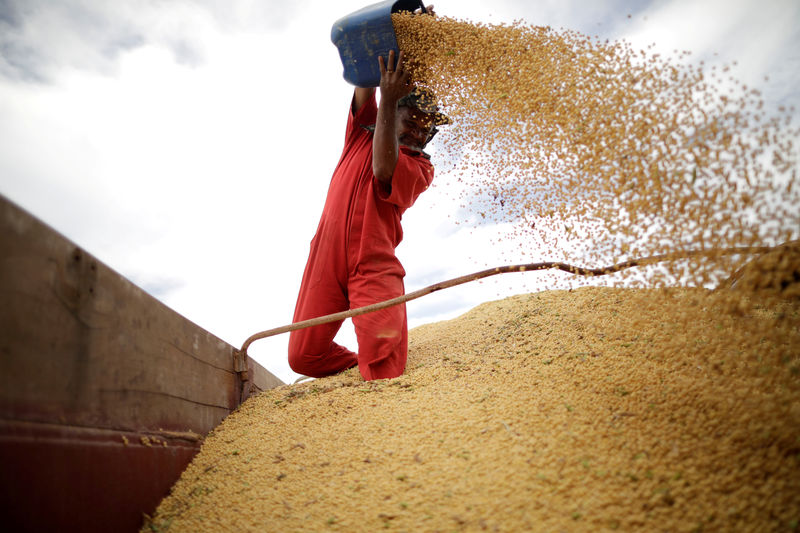By Ana Mano
SAO PAULO (Reuters) - A spate of farmer defaults in Brazil's top grain-producing state is creating headaches for global traders who are among their main creditors and posing challenges to the widespread use of barter in the world's largest soybean exporter.
The battles in Mato Grosso bankruptcy courts pit farmers against international trading houses, such as France's Louis Dreyfus Corp (LDC) and U.S.-based Bunge Ltd, which have been lending aggressively to producers through Brazil's unique barter system to protect profit margins from newer traders in China.
The scale of Brazilian farmer bankruptcies are a far cry from the plight of their U.S. peers, who have struggled recently with extreme weather and a trade war with China.
Still, the cases reveal the risks in Brazil of poor farm management, a weak economy and an ambiguous bankruptcy code, which have spelled trouble for traders despite a soy boom fed by U.S.-China trade tensions.
Trading firms have been stymied to find that farmers they lent to as individuals are often able to seek bankruptcy protection as if they were corporations - making it harder to recover millions of dollars of soybeans under contract.
Judiney de Souza, the chief executive of Amaggi, Brazil's biggest domestically owned trader, said the recent wave of farmer bankruptcies in Mato Grosso is "a cause for concern."
"When the courts grant bankruptcy protection without observing the legal requirements, this puts our credit analysis at risk," Souza said.
Amaggi said it has fought to seize almost 24,000 tonnes of soybeans from one farmer, Zeca Viana, whose obligations to the trader were among 312 million reais ($76 million) of debt on which he defaulted this year.
"My main concern is lack of credit to finance the coming crop," said Viana, a former state lawmaker who blamed his fate on costly expansions, bad weather and political distractions. He is now struggling to sell his beans due to disputes with major trading firms.
Viana's lawyer Euclides Ribeiro, who represents more than a half dozen major Mato Grosso farmers who filed for bankruptcy protection in the past few years, said the traders' claims must be weighed against those of other creditors in court.
LDC also resorted to courts to seize nearly 12,000 tonnes of soybeans from Viana, worth about $5 million, according to LDC lawyer Thiago Gerbasi. He said the firm had paid for Viana's beans in 2018 through a fertilizer-for-grain barter arrangement.
If traders keep getting stiffed on contracts of that kind, they warn they will become more stringent about new deals, pinching a key source of credit for farmers in the world's second-largest soy producer.
BARTER BOOM
In Brazil's longstanding barter system, traders finance farmers' seeds, fertilizer and other inputs early in the season to guarantee delivery of grains at harvest time.
A response to decades of scarce bank loans, barter took off in recent years as traders sought ways to lock in and profit from relationships with farmers in the face of new rivals sourcing beans in Brazil.
"With more players competing for the soy, origination margins got slim and traders moved to sell farm inputs as a way to grab margins from other business segments," said a person at Cargill Inc who asked for anonymity to speak freely.
Cargill declined to comment.
Barter arrangements with global traders and agrochemical firms surged six-fold in five seasons to around a third of Mato Grosso farmers' financing for the latest crop, according agricultural research group Imea.
Imea researchers also attributed the recent rise in barter to tighter lending by private-sector banks in a recent downturn, along with a reduction in public-sector farm loans as government budgets have tightened.
The default rate on farm loans more than doubled in five years to average 2.8 percent last year, according to Brazil's central bank, even as defaults in the broader economy fell to a multi-year low.
New agribusiness bankruptcy filings in the state of Mato Grosso rose to nine last year - the highest annual tally since 2015, according to credit services firm Serasa.
'BANKRUPTCY INDUSTRY'
As traders became more exposed to farmers' credit risk, they learned the hard way that their contracts with farm owners could be suspended by slow-moving corporate bankruptcy courts.
Many farmers pay taxes as individuals rather than as companies, but their lawyers argue that they operate as businesses, giving them the right to the same orderly in-court reorganization as other firms.
Soy crushing group Abiove, whose members include the big four global trading firms, calls that a loophole created by the country's "bankruptcy industry."
"Abiove worries about the inappropriate use of bankruptcy protection by farmers. The cases have been rising steadily," said Abiove President André Nassar.
While local judges often accept farmers' bankruptcy filings in Mato Grosso, state appeals courts have thrown out several cases on the grounds that farmers were not registered as firms. Federal courts have not issued a ruling to settle the matter.
That has created a cloud of legal uncertainty for traders trying to gauge risk for their barter business.
Roberto Marcon, director of origination at Bunge in Brazil, said trading companies are reconsidering the guarantees they require from farmers in exchange for credit.
"Trading companies are not banks. They give funding or farm inputs and want the grains back," said Amaggi's Souza.
